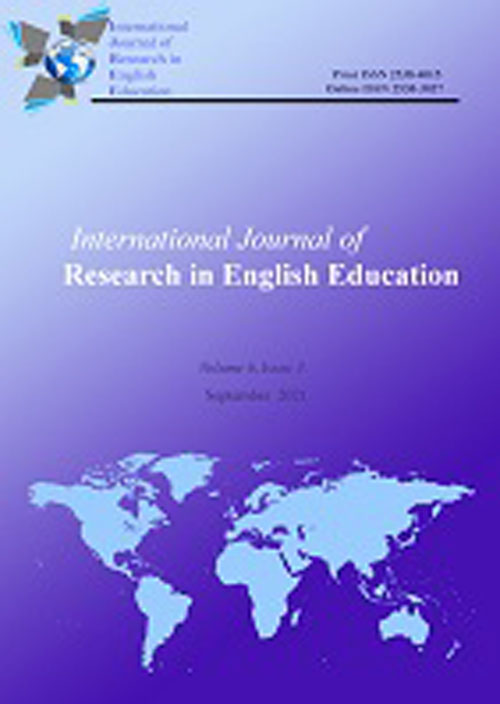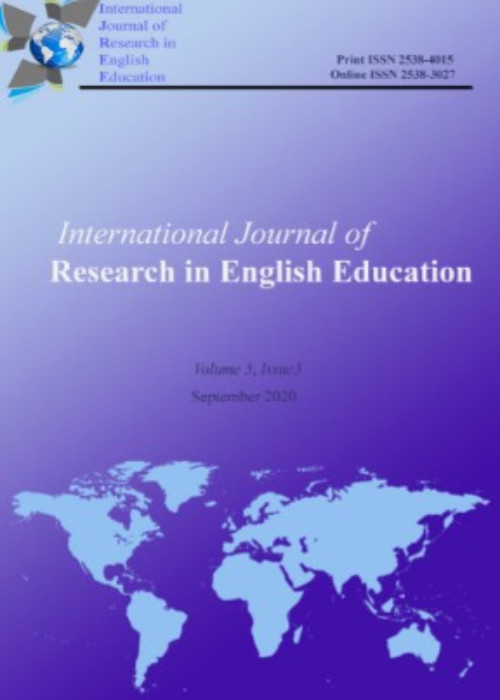فهرست مطالب

International Journal of Research in English Education
Volume:6 Issue: 3, Sep 2021
- تاریخ انتشار: 1400/07/24
- تعداد عناوین: 7
-
Pages 1-20
Although there is a large body of literature on the use of connectors by EFL learners in argumentative writing, African language learner groups are not represented and most studies have adopted a cross-sectional approach. This paper seeks to analyze how frequently connectors are used on the basis of pseudo-longitudinal data from first, second, and third-year undergraduate students from the Institute for Applied Pedagogy, University of Burundi. The study adopted the corpus linguistic and quantitative approaches. The data were collected through 2 writing assignments given to students in 2019. In total, 622 essays, amounting to 306,664-word tokens, were collected. Data preparation followed three steps, namely, typing the handwritten essays, preparing the TXT files, and metadata for the corpus. The latter was searched using AntConc tool, on the basis of a comprehensive list of 95 connectors, classified into 6 categories. The tool availed frequency information, that is, how often each connector occurs in the corpus. Percentages were computed using XLS facility and are presented in tables and graphs. Results indicate that 19 connectors were frequently used by learners, the most frequent ones being those which add information followed by those expressing a result relationship. However, connectors expressing transition and summation were found to be rarely used in the corpus. Another discovery is that learners in all three years of study seem to have the same preferences in terms of connectors. Furthermore, cases of misuse such as wrong combinations and incorrect spelling, semantic, stylistic and syntactic errors were observed at all levels. The findings of this study can be useful to learners, teachers, and material designers.
Keywords: connectors, EFL learners, preference, misuse, argumentative writing -
Pages 21-40
This study was an investigation of the washback impacts of task-based assessment on Iranian EFL learners’ vocabulary learning and grammatical ability at the intermediate level. For this purpose, 184 male and female students who were in their third year of school were chosen from 12 schools of (X) (X). This election was done via a multistage cluster random sampling technique using the Cambridge Placement Test (2010). All of the sessions were divided into two parts, 20 minutes were considered for teaching grammar and 20 minutes were for teaching vocabulary. The components of this study were Oxford Practice Grammar Intermediate Diagnostic Test and a standard vocabulary test extracted from TOEFL exams between 2017-2020. The researchers prepared a test for every two groups at the end of every three sessions. It was found that by removing the pre-test factor, the covariance, the task-based evaluation’s washback impact makes the grammatical and vocabulary learning of students better. Considering the reality that every academic endeavor contains planned testing and evaluation techniques to maximize academic achievement and progress, the findings hint that TBLA as an academic measurement device can nicely replace the traditional evaluation techniques.
Keywords: grammatical ability, task-based assessment, vocabulary learning, washback impact -
Pages 41-59
This study examined the effects of EFL teacherschr('39') behavior on intermediate L2 learners’ WTC in English. To this end, a proficiency test was administered to 150 female learners, and 98 intermediate learners aged 16 to 26 were recruited as the participants. Subsequently, a WTC questionnaire was distributed among them to measure their level of WTC. Moreover, interviews were carried out with 30 volunteers who agreed to participate in this phase of the study. The results of the analysis of the WTC questionnaire showed that the WTC level of the learners could be rated as above-average. Besides, the results of the interviews revealed that different kinds of teachers’ behavior affected learners’ WTC both positively and negatively: teachers’ sense of humor and rapport could positively affect learners’ WTC; on the other hand, teachers’ methods of error correction while learners’ speaking and teachers’ lack of support could negatively affect learners’ WTC. Additionally, according to learners’ perspectives, there were a number of ways through which a language teacher could increase the learners’ WTC in English such as encouraging learners to read extra-curricular topics and highlighting learners’ strengths instead of their weaknesses. Several implications were proffered at the end of the study to heighten the awareness of L2 teachers, teacher-trainers, and language institute managers regarding the issue under investigation.
Keywords: teachers’ behavior, EFL learners, willingness to communicate (WTC) -
Pages 60-68
This study aimed to create medical terminology flashcards in the form of teaching and learning aids for use in the specialized language and medical terminology courses at Guilan University of Medical Sciences, Iran. To achieve the objective of the study, first, a needs analysis was conducted, which showed the scarcity of such educational materials and students’ needs for them. Next, the structure and the content of information of the flashcards were developed; then, the designed flashcards were examined and modified. Afterwards, professors who were experienced in teaching medical terminology and specialized language courses evaluated the flashcards using a questionnaire. Moreover, an interview was conducted with the professors on ways to improve the quality of the flashcards. The results showed that the professors were satisfied with the potential learning effects, the structure, and the content of information of the flashcards. They also suggested a few modifications to the flashcards and recommended that the flashcards should be used in the university courses. The study has implications for the development of educational materials in the form of teaching and learning aids.
Keywords: flashcards, medical terminology, educational materials, professors -
Pages 69-85
Within the realm of lexis, the area of collocation is of prime importance to producing natural-sounding language for anyone learning a foreign language. This study aimed at investigating the effects of two modes of sentence writing versus multiple-choice test practice manipulation on Iranian intermediate EFL learners’ lexical collocation learning. For this purpose, to ensure the homogeneity of the participants, Preliminary English Test (PET) was administered to 87 students studying English at two English institutes of Ofoghhaye Nour and Nourmahdi in Roudsar, Guilan, through which 60 students were selected as the target participants. They were intermediate students with the age range between 17 and 23. They were then divided into two equal comparison groups: Sentence-writing Group (SRG) and Multiple-choice Group (MCG). A piloted pretest of lexical collocation was administered to both groups. Then both groups underwent a 7-session treatment. SRG was treated by the virtue of sentence-writing practice for the target collocations, and MCG was instructed through recognition practice, here multiple-choice practice. After the treatment period, the same version of lexical collocation test was administered to both groups as posttest to examine the effectiveness of the treatments. The results of paired-samples and independent samples t-tests indicated that both groups had collocation gains but the effectiveness of multiple-choice test manipulation on learners’ lexical collocation outweighed that of the sentence-writing mode of test practice manipulation. The implications and recommendations were also presented.
Keywords: lexical collocation, EFL learners, multiple-choice, sentence-writing, test practice -
Pages 86-95
Writing as one of the important skills needed for communication has always been the topic of research in English teaching contexts. To improve the writing of English students, teachers employ different methods. This study was designed to investigate the impact of the inquiry learning method on the grammatical accuracy of Iranian EFL learners’ writing. To do so, 90 intermediate EFL learners from Abadan Medical University were selected through the Oxford Placement Test (OPT) and participated in a quasi-experimental study, and then they were randomly divided into experimental and control groups (EG & CG). Their ages ranged between 20 to 30. A pretest was administered to compare the results of their performance at the beginning of the study. The inquiry learning method was taught to the EG as the treatment, while the conventional method was employed for the CG. In the experimental class, the teacher did not teach everything directly, and the learners were expected to discover the knowledge and generate rules, but the presentation of materials in the CG was conventional without any discussion, and the students in the CG were mainly passive. After the instruction, a posttest was given to both groups to observe the impact of the inquiry learning method on the grammatical accuracy of their writings. The analysis of the data was accomplished through the application of a dependent sample t-test and an independent-samples t-test to compare the mean scores, and the results indicated that the inquiry learning method improved the EGs̕ writing, and they outperformed the CG. The findings of this study could have implications for the EFL learners, teachers, and material designers that may help them in EFL language learning and teaching.
Keywords: conventional method, inquiry learning method, Iranian EFL learners, language learning, writing -
Pages 96-116
Textbook evaluation seems to be inevitable where textbooks are the main source of teaching and learning processes. This study aimed to investigate to what extent chr('39')chr('39')Vision 3chr('39')chr('39') (the last volume of the English book series entitled “English for schools”) has the characteristics of a CLT syllabus based on teachers’ points of view. To fulfill the objectives of this study, 60 male and female high school English teachers, teaching at different high schools answered an online questionnaire adapted from AbdelWahab (2013) which is a 3-point Likert scale checklist (i.e. poor, satisfactory, & good). The design of the scale enabled the researchers to evaluate the book in terms of four main criteria including; (1) physical and utilitarian attributes, (2) efficient outlay of objectives and supplementary materials, (3) learning/teaching content, and (4) language skills. The analysis of the data indicated that EFL teachers had a positive attitude towards the English textbook based on the CLT principles except for cultural considerations. The conclusion indicates that the book needs to be modified to include some aspects of cultural values about the target language culture. The results can guide the teachers, syllabus designers, textbook writers, evaluators, and curriculum designers in their planning and designing of future textbooks.
Keywords: communicative approach, textbook evaluation, vision 3


